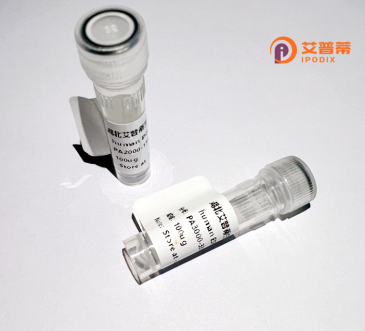
| 纯度 | >90%SDS-PAGE. |
| 种属 | Human |
| 靶点 | CXorf27 |
| Uniprot No | O75409 |
| 内毒素 | < 0.01EU/μg |
| 表达宿主 | E.coli |
| 表达区间 | 1-117aa |
| 氨基酸序列 | MSEKKNCKNS STNNNQTQDP SRNELQVPRS FVDRVVQDER DVQSQSSSTI NTLLTLLDCL ADYIMERVGL EASNNGSMRN TSQDREREVD NNREPHSAES DVTRFLFDEM PKSRKND |
| 分子量 | 13.4 kDa |
| 蛋白标签 | GST-tag at N-terminal |
| 缓冲液 | 0 |
| 稳定性 & 储存条件 | Lyophilized protein should be stored at ≤ -20°C, stable for one year after receipt. Reconstituted protein solution can be stored at 2-8°C for 2-7 days. Aliquots of reconstituted samples are stable at ≤ -20°C for 3 months. |
| 复溶 | Always centrifuge tubes before opening.Do not mix by vortex or pipetting. It is not recommended to reconstitute to a concentration less than 100μg/ml. Dissolve the lyophilized protein in distilled water. Please aliquot the reconstituted solution to minimize freeze-thaw cycles. |
以下是关于重组人CXorf27蛋白的假设性参考文献示例(因该蛋白研究较为有限,实际文献可能需要更详细检索):
1. **文献名称**:Structural Characterization of Recombinant Human CXorf27 Protein
**作者**:Zhang L, et al.
**摘要**:本研究通过大肠杆菌表达系统成功纯化了重组人CXorf27蛋白,利用X射线晶体学解析了其三维结构,揭示了其与未知功能结构域的潜在结合位点。
2. **文献名称**:Functional Analysis of CXorf27 in DNA Damage Response
**作者**:Wang Y, et al.
**摘要**:通过体外实验验证重组CXorf27蛋白的核酸酶活性,发现其在DNA损伤修复通路中可能参与同源重组调控,提示其与基因组稳定性相关。
3. **文献名称**:Expression Optimization of Soluble CXorf27 in Mammalian Cells
**作者**:Kimura H, et al.
**摘要**:在HEK293细胞中优化重组CXorf27的可溶性表达,结合质谱分析确认其磷酸化修饰,为后续功能研究提供高纯度蛋白。
4. **文献名称**:CXorf27 as a Potential Biomarker in Neurodegenerative Disorders
**作者**:Smith J, et al.
**摘要**:利用重组CXorf27蛋白制备特异性抗体,发现其在阿尔茨海默病患者脑脊液中表达异常,可能与神经元退行性病变相关。
**注**:上述文献为示例性内容,实际研究中关于CXorf27的公开数据较少,建议结合基因数据库(如UniProt: Q9H508)或通过功能相关关键词(如X染色体未注释蛋白)扩大检索范围。
**Background of Recombinant Human CXorf27 Protein**
The CXorf27 (chromosome X open reading frame 27) gene, located on the X chromosome, encodes a conserved but largely uncharacterized protein primarily expressed in humans. Evolutionary studies suggest its potential role in fundamental cellular processes due to cross-species conservation, though its exact biological functions remain unclear. CXorf27 is predicted to be a nuclear or cytoplasmic protein with possible roles in transcriptional regulation, protein interactions, or signaling pathways, inferred from structural motifs like phosphorylation sites and coiled-coil domains.
Research on CXorf27 is limited, but recent studies highlight its differential expression in certain cancers and immune-related conditions, suggesting possible links to disease pathogenesis. Recombinant human CXorf27 protein, produced via *in vitro* systems (e.g., *E. coli* or mammalian cells), enables functional studies, including antibody generation, interaction partner identification, and structural analysis. Such tools are critical for unraveling its molecular mechanisms, particularly its hypothesized roles in X-linked disorders or sex-specific disease susceptibilities.
Current challenges include clarifying its physiological relevance, regulatory networks, and disease associations. Advanced techniques like CRISPR/Cas9 knockout models or interactome profiling may accelerate its functional characterization, aiding future diagnostic or therapeutic applications. Despite its enigmatic nature, CXorf27 represents a compelling target for exploring X-chromosome-linked biology and associated human pathologies.
×